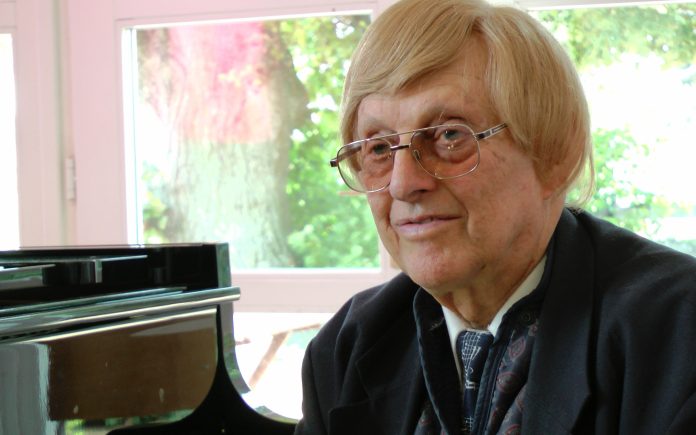Peter Feuchtwanger, who has died aged 85, was the go-to trainer for lots of the world’s main live performance pianists. He ready Martha Argerich for her win on the 1965 Chopin Competitors in Warsaw; helped Shura Cherkassky to beat his nerves; and coached David Helfgott, whose battle with psychological sickness was depicted within the movie Shine.
Feuchtwanger had been a promising, self-taught pianist, however on the age of 20 gave up performing to carve out a distinct segment as a trainer. Nonetheless, he turned down positions at main music schools, claiming that hour-long classes and the requirement for college kids to take a seat examinations weren’t conducive to his strategies. Some referred to as him the Zen grasp of piano enjoying, along with his perception in rest, deep respiration and whole calm. “Posture mixed with each the steadiness and the right peak of the piano stool are the sine qua non for proper enjoying,” he insisted.
He was notably impressed by Clara Haskil’s method. When he requested her concerning the fingering for a very tough passage of music she replied: “No matter comes”, inspiring Feuchtwanger to undertake the same method, urging his college students to undertake completely different fingerings every time they performed.
Peter Bernard Feuchtwanger was born in Munich on June 26 1930. In 1555 his ancestors had left the Bavarian city of Feuchtwangen, the place he would later run a piano competition. His father, Theodore, a cousin of the German-Jewish novelist Lion Feuchtwanger, was a financial institution director in Munich who fled Germany early within the Second World Struggle, taking his household to Haifa. His mom, Amalie, can be murdered in a resort room in her eighties.
Particulars of younger Peter’s formative years are hazy. He instructed of enjoying truant to go to the house of a girl who owned a piano. He had heard recordings at dwelling of Chopin, Beethoven and Liszt. He began enjoying them from reminiscence, however the report participant had been operating too quick, so he had memorised the works within the unsuitable key.
Inevitably his truancy was found, however as the reality about his expertise emerged his mother and father organized a proper piano lesson, the place he performed the second of Liszt’s La Leggierezza, albeit in F sharp minor fairly than F minor. By no means having seen a rating he failed a sight-reading take a look at, and when the trainer positioned a quantity of Beethoven sonatas on the piano he guessed that they have been the sluggish actions of the Moonlight, Pathétique and Appassionata sonatas. He was unsuitable. Though he was simply capable of transpose the Liszt into the right key, Feuchtwanger was so embarrassed by the trainer’s scolding that he by no means returned.
He was despatched to Zurich to turn out to be a banker, however wound up in London, took classes with Edwin Fischer and Walter Gieseking, and gave a handful of public recitals. His performing profession ended after he turned up at a live performance anticipating to play one Beethoven sonata however discovered that one other had been marketed which the promoter insisted he play, regardless that he barely knew the work. “All the pieces went with out a hitch till six or seven pages earlier than the top,” he recalled. “Abruptly I had no concept which key comes subsequent. I began to sweat; I improvised the fugue for perhaps 10 minutes … sooner or later I discovered myself on the final web page and remembered the top.”
Throughout childhood visits to Druze and Bedouin villages, Feuchtwanger had absorbed many Arabic musical kinds, and on the Faculty of Oriental and African Research in London he studied Indian and Arabic music, mastering the sitar. Malcolm Binns carried out his Variations on an Japanese People Tune on the Wigmore Corridor in 1958. “They include good piano writing and present a lot invention in extracting curiosity from a repetitious little tune,” famous one critic. His Raga Tilang, for violin, sitar, tabla and tamboura, was written for Menuhin and Ravi Shankar’s collaboration on the Tub Competition in 1966.
Though he was a daily juror, Feuchtwanger professed to disliking competitions, claiming that they “encourage quick, loud and mechanical enjoying”. Lots of his college students have been “secret pupils”, well-known pianists who didn’t need it identified that they have been nonetheless finding out. One among his extra promising “unknowns” was Domingos de Vasconcellos, who drowned within the Marchioness catastrophe in 1989.
A lot of his time was break up between Munich and London, the place he lived in a penthouse residence close to Knightsbridge. Though he was seen at many live shows, he was an unassuming presence, providing solely phrases of kindness and encouragement. He’s survived by his accomplice, the artist Michael Garady.
Peter Feuchtwanger, born June 26 1930, died June 17 2016














